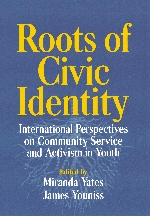Book contents
- Frontmatter
- Contents
- Preface
- List of Contributors
- Introduction: International Perspectives on the Roots of Civic Identity
- 1 Community Service and Political-Moral Discussions among Adolescents: A Study of a Mandatory School-Based Program in the United States
- 2 Social and Family Determinants of Community Service Involvement in Canadian Youth
- 3 Exploring Adolescent Altruism: British Young People's Involvement in Voluntary Work and Campaigning
- 4 Youth, Solidarity, and Civic Commitment in Italy: An Analysis of the Personal and Social Characteristics of Volunteers and Their Organizations
- 5 Political Socialization in the New States of Germany
- 6 Community Service and Social Cognitive Development in German Adolescents
- 7 Adolescents and the “Social Contract”: Developmental Roots of Citizenship in Seven Countries
- 8 Political Socialization in a Divided Society: The Case of Northern Ireland
- 9 Youth Experience in the Palestinian Intifada: A Case Study in Intensity, Complexity, Paradox, and Competence
- 10 Beyond the Call of Duty: The Service of Israeli Youth in Military and Civic Contexts
- 11 Recent Trends in Civic Engagement among Japanese Youth
- 12 Learning Politics in the Crucible: The Socialization of Taiwan High School Students as Citizens in a New Democracy
- Conclusion: Transcending Themes
- Author Index
- Subject Index
12 - Learning Politics in the Crucible: The Socialization of Taiwan High School Students as Citizens in a New Democracy
Published online by Cambridge University Press: 04 August 2010
- Frontmatter
- Contents
- Preface
- List of Contributors
- Introduction: International Perspectives on the Roots of Civic Identity
- 1 Community Service and Political-Moral Discussions among Adolescents: A Study of a Mandatory School-Based Program in the United States
- 2 Social and Family Determinants of Community Service Involvement in Canadian Youth
- 3 Exploring Adolescent Altruism: British Young People's Involvement in Voluntary Work and Campaigning
- 4 Youth, Solidarity, and Civic Commitment in Italy: An Analysis of the Personal and Social Characteristics of Volunteers and Their Organizations
- 5 Political Socialization in the New States of Germany
- 6 Community Service and Social Cognitive Development in German Adolescents
- 7 Adolescents and the “Social Contract”: Developmental Roots of Citizenship in Seven Countries
- 8 Political Socialization in a Divided Society: The Case of Northern Ireland
- 9 Youth Experience in the Palestinian Intifada: A Case Study in Intensity, Complexity, Paradox, and Competence
- 10 Beyond the Call of Duty: The Service of Israeli Youth in Military and Civic Contexts
- 11 Recent Trends in Civic Engagement among Japanese Youth
- 12 Learning Politics in the Crucible: The Socialization of Taiwan High School Students as Citizens in a New Democracy
- Conclusion: Transcending Themes
- Author Index
- Subject Index
Summary
Reading Taiwan's history is painful. It seems as though everyone has just used this piece of earth as a stepping-stone. I'm suspicious how many people really would be willing to put themselves out for the sake of this piece of earth, no matter whether you're talking about Han Chinese, the Japanese, or the Republican government. People are always opposing something, but they don't know what it is they want.… Sometimes I read books from the China mainland, and I can see that they are so confident and proud of their country. When are people in Taiwan going to be able to face up to the past and find their own road?
(from a 17-year-old Taibei high school senior, 1994)Introduction: Taiwan as a Frontier Political Space
This chapter discusses how students at college-preparatory high schools in Taiwan have engaged with the island's political transformation from an authoritarian regime to democracy. Any discussion of political activity by Taiwan students must take into account the larger historical framework of Taiwan society in the past 50 years, and Taiwan's place in the larger spatial and temporal orbit of modern China's history (Shepherd, 1993).
Chiang Kai-shek and his Nationalist partisans (KMT) gained control of Taiwan, a Japanese colony since 1895, at the end of World War II. Civil war broke out on the mainland between the KMT and Mao Zedong's Communists soon after the Japanese surrender, and refugees from the mainland began pouring onto Taiwan. In April 1948, the newly elected National Assembly on the mainland approved temporary amendments to the ROC Constitution, which resulted in the imposition of martial law in Taiwan.
- Type
- Chapter
- Information
- Roots of Civic IdentityInternational Perspectives on Community Service and Activism in Youth, pp. 245 - 264Publisher: Cambridge University PressPrint publication year: 1998



